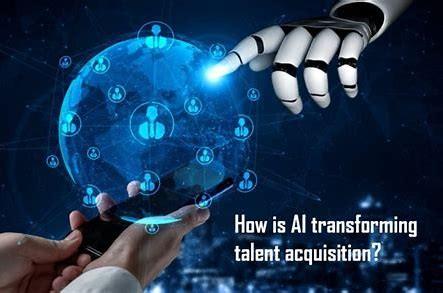In the fast-paced world of recruitment, the integration of artificial intelligence (AI) is ushering in a transformative era for talent acquisition. As technology continues to advance, organizations are leveraging AI to optimize and streamline their hiring processes, resulting in improved efficiency, accuracy, and strategic decision-making. This article delves into the profound impact of AI on talent acquisition and explores the various ways in which it is reshaping the recruitment landscape.
Revolutionizing Resume Screening
Traditionally, resume screening has been a time-consuming and manual task for recruiters. Sorting through stacks of resumes to identify the most qualified candidates can be a daunting process. AI is changing this paradigm by introducing automated resume screening powered by machine learning algorithms.
These algorithms analyze resumes and applications, identifying keywords, skills, and qualifications that match the job requirements. This not only accelerates the screening process but also ensures a more objective evaluation of candidates. As a result, recruiters can focus their efforts on engaging with potential hires rather than sifting through countless resumes.
Advanced Candidate Sourcing
AI is enabling recruiters to tap into a wider pool of potential candidates through advanced sourcing techniques. Machine learning algorithms can scour various online platforms, social networks, and databases to identify individuals whose skills and experiences align with the organization's needs.
This approach broadens the talent pipeline and helps organizations discover hidden gems who may not have applied through traditional channels. By leveraging AI-powered candidate sourcing, businesses can access a diverse and qualified pool of candidates, increasing the chances of finding the perfect fit.
Personalized Candidate Experience
The candidate experience has become a critical factor in attracting top talent. AI is transforming this experience by delivering personalized interactions and communication throughout the recruitment journey. Chatbots and virtual assistants powered by AI can engage with candidates in real time, answer their questions, and provide updates on their application status.
This level of personalization enhances the candidate's perception of the organization and creates a positive impression, even if they are not ultimately selected for the role. By offering tailored experiences, companies can build stronger relationships with candidates and bolster their employer brand.
Predictive Analytics for Informed Decisions
AI's predictive capabilities are playing a pivotal role in talent acquisition by providing insights that drive informed decisions. By analyzing historical data, AI algorithms can forecast which candidates are more likely to succeed in a specific role. This predictive analysis helps recruiters make well-informed hiring choices based on data-driven insights.
Moreover, predictive analytics can extend to identifying trends in candidate behavior and preferences, enabling organizations to tailor their recruitment strategies accordingly. This data-driven approach ensures that the hiring process is not only efficient but also aligned with the organization's long-term goals.
Bias Reduction and Diversity Promotion
Unconscious bias has been a longstanding challenge in recruitment, affecting diversity and inclusion efforts. AI is addressing this issue by reducing bias in the decision-making process. AI algorithms evaluate candidates based on objective criteria, mitigating the impact of subjective biases.
Furthermore, AI can analyze historical hiring data to identify patterns of bias and recommend corrective actions. This commitment to fairness and inclusivity helps organizations create a more diverse workforce that reflects a broad range of backgrounds and perspectives.
Streamlined Interviewing and Assessment
AI is optimizing the interviewing and assessment stages of talent acquisition by introducing automation and data-driven insights. Video interviews, powered by AI, allow candidates to answer pre-recorded questions at their convenience. AI analyzes their responses, evaluating not only the content but also non-verbal cues.
This streamlined process eliminates scheduling conflicts and standardizes the evaluation process, ensuring a consistent and fair experience for all candidates. Additionally, AI-powered assessments provide a deeper understanding of a candidate's skills and capabilities, aiding in accurate decision-making.
Enhanced Onboarding and Employee Experience
AI's impact on talent acquisition doesn't end with hiring; it extends to the onboarding process and beyond. AI-powered onboarding platforms can provide new hires with personalized training plans, introductions to team members, and guidance on company culture.
By enhancing the onboarding experience, AI contributes to higher employee satisfaction and retention rates. This holistic approach to AI talent acquisition ensures that the transition from candidate to employee is smooth and positive.
Conclusion
As AI continues to evolve, its role in talent acquisition becomes increasingly significant. The transformation brought about by AI encompasses various stages of the recruitment process, from resume screening and candidate sourcing to interviewing, decision-making, and onboarding.
By embracing AI, organizations can optimize their talent acquisition efforts, attract top-tier candidates, and make more informed and unbiased hiring decisions. The integration of AI not only enhances efficiency but also elevates the candidate experience, diversity promotion, and overall strategic effectiveness of talent acquisition.
In the ever-changing landscape of recruitment, AI is indeed a transformative force that is shaping the future of talent acquisition, enabling organizations to build dynamic and thriving teams that drive success in the digital age.


